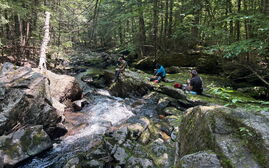Processing Your Payment
Please do not leave this page until complete. This can take a few moments.
- News
-
Editions
View Digital Editions
Biweekly Issues
- December 15, 2025
- December 1, 2025
- Nov. 17, 2025
- November 03, 2025
- October 20, 2025
- October 6, 2025
- + More
Special Editions
- Lists
- Viewpoints
-
Our Events
Event Info
Award Honorees
- Calendar
- Biz Marketplace
Federal hemp rules provide some clarity, and leeway, for growers
Maine’s hemp producers may get some leeway when it comes to the level of THC allowed in their product, under federal regulations released Tuesday.
Under the U.S. Department of Agriculture’s draft rules, hemp crops with a THC content between 0.3% and 0.5% will fall within a “measurement of uncertainty” and won’t result in a violation for the grower.
The USDA acknowledged that plant genetics and testing variations could account for high levels of THC, or tetrahydrocannabinol, the psychoactive compound found in marijuana and hemp.
“USDA recognizes that hemp producers may take the necessary steps and precautions to produce hemp … yet still produce plants that exceed the acceptable hemp THC level,” the rules read.
The THC guidance is one of the highlights of the rules, which take effect Thursday when they're published in the Federal Register. They will trigger a 60-day public comment period, and the USDA is waiting until the conclusion of that period before approving state plans for hemp sales.
Hemp was legalized by Congress in the 2018 Agriculture Improvement Act and states have looked for direction about how to regulate it.
Last week, Gov. Janet Mills explained the urgency of the need to U.S. Secretary of Agriculture Sonny Perdue. In a letter, Mills wrote: "Growers in Maine are receiving notices of bank account closures and insurance policies not being renewed because of uncertainty around federal hemp regulations. These are troubling developments that stifle the growth and aspirations of hardworking farm businesses."
On Tuesday, Commissioner of Agriculture, Conservation and Forestry Amanda Beal said in a statement, "States like Maine and farmers across the country have been in limbo as we awaited this importance guidance outlining how states would implement commercial hemp production. We will continue to work with stakeholders across Maine, including the congressional delegation and the USDA, in making sure that this guidance makes sense for Maine farmers and business owners.”
Mainebiz web partners
Related Content

The Giving Guide
The Giving Guide helps nonprofits have the opportunity to showcase and differentiate their organizations so that businesses better understand how they can contribute to a nonprofit’s mission and work.
Learn More
Work for ME
Work for ME is a workforce development tool to help Maine’s employers target Maine’s emerging workforce. Work for ME highlights each industry, its impact on Maine’s economy, the jobs available to entry-level workers, the training and education needed to get a career started.
Learn More
Groundbreaking Maine
Whether you’re a developer, financer, architect, or industry enthusiast, Groundbreaking Maine is crafted to be your go-to source for valuable insights in Maine’s real estate and construction community.
Learn more-
The Giving Guide
The Giving Guide helps nonprofits have the opportunity to showcase and differentiate their organizations so that businesses better understand how they can contribute to a nonprofit’s mission and work.
-
Work for ME
Work for ME is a workforce development tool to help Maine’s employers target Maine’s emerging workforce. Work for ME highlights each industry, its impact on Maine’s economy, the jobs available to entry-level workers, the training and education needed to get a career started.
-
Groundbreaking Maine
Whether you’re a developer, financer, architect, or industry enthusiast, Groundbreaking Maine is crafted to be your go-to source for valuable insights in Maine’s real estate and construction community.
ABOUT
NEW ENGLAND BUSINESS MEDIA SITES
No articles left
Get access now
In order to use this feature, we need some information from you. You can also login or register for a free account.
By clicking submit you are agreeing to our cookie usage and Privacy Policy
Already have an account? Login
Already have an account? Login
Want to create an account? Register
Get access now
In order to use this feature, we need some information from you. You can also login or register for a free account.
By clicking submit you are agreeing to our cookie usage and Privacy Policy
Already have an account? Login
Already have an account? Login
Want to create an account? Register











0 Comments